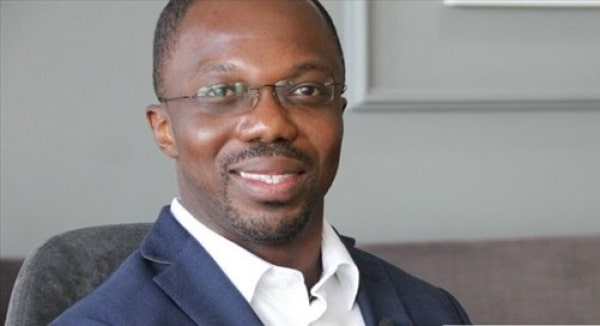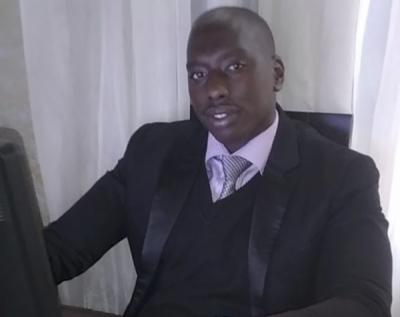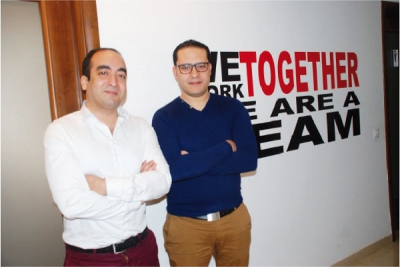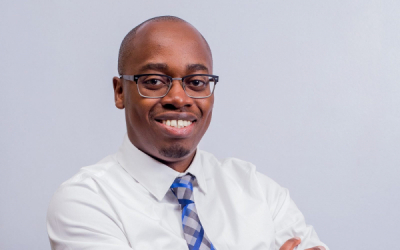
TECH STARS (1006)
Alexandre N'Djore (photo), on March 10, 2022, successfully raised €300,000 in seed funding to develop his startup Digitech Group. Founded in 2016 with Zachariah George, the startup specializes in insurance technology solutions. Digitech Group offers insurance and reinsurance companies a set of fully integrated, cloud-based web and mobile solutions to improve their productivity and competitiveness.
Digitech Group was founded after Alexandre N'Djore noticed the fragmented and broken state of the insurance sector in Africa. According to the former MTN Côte d’Ivoire’s logistics manager, the problem affects the whole sector, right from insurers to policy buyers. " This leads to a generally low insurance penetration in Africa, about 3%, except for South Africa,” he says.
For its new development phase, Digitech Group created Hyperion 2.0, an ERP system that automates transactions between insurers and reinsurers, saves time and money, eliminates errors, and provides real-time critical business information.
Alexandre N'Djore holds an MBA from the Hult International Business School in Dubai. He also obtained a Master's degree in supply chain and transport engineering from Ecole Supérieure de Commerce et d'Administration des Entreprises (ESCAE) in Abidjan. The Master’s degree opened doors to executive positions in supply chain logistics for him. For instance, for four years, he has been the director of catering at Air Ivoire.
His ambition is to transmit the operational efficiency he acquired during his professional career in the supply and logistics chain to the African insurance sector. Since the creation of Digitech Group, the tech entrepreneur claims to have processed more than 7 million insurance policies. His dynamism earned him numerous awards, including the best Insuretech Award, offered in 2020, by the Federation of African National Insurance Companies (FANAF). In 2018, Digitech Group won the Best Startup award in South Africa, by Amazon Web Services at the AWS Startup Day.
Melchior Koba
Fintech startup ImaliPay announced on Thursday (April 7), the successful completion of a US$3 million funding round. The startup -founded by Tatenda Furusa (photo, left) and Oluwasanmi Akinmusire (photo, right)- will use the funds to expand its team with new talents, improve its one-stop-shop platform, and enter new markets (Ghana and Egypt in that instance).
Currently, ImaliPay’s app is available only on Play Store. Through its app and thanks to strategic partners, the startup offers actors of the gig economy access to various financial services still inaccessible to them. The services include Buy Now Pay Later, investments, savings, and insurance.
“We researched the gig economy and found that they were neglected by some financial services. And we saw that we were perfectly placed on building a fintech solving the problems of Africa’s gig economy workers, freelancers, and self-employed digital workers,” explains Tatenda Furusa, CEO of ImaliPay.
The CEO obtained a business and management master's from the University of Nottingham, UK, in 2017. His co-founder Oluwasanmi Akinmusire graduated with a Master of Business Administration, from Ajayi Crowther University in Oyo, Nigeria, in 2019. The two partners worked at Cellulant, a pan-African firm that provides local alternative payment solutions for global, regional, and local merchants. They want to foster financial inclusion in Africa, whose citizens are excluded from most of the traditional financial services.
In 15 months of operation, ImaliPay's user base has grown 60-fold, and the fintech claims over 200,000 transactions via its platform. Freelancers can access its services at 4,500 physical outlets.
Adoni Conrad Quenum
Algerian entrepreneur Noureddine Tayebi, heads, from Silicon Valley, Yassir, a carpooling and home-delivery app. The platform, which works in Africa, Europe, and America, aims to diversify its offer and expand to french-speaking markets in sub-Saharan Africa.
After studying engineering in Algeria, Noureddine Tayebi (photo) flew to the U.S. in 1998 to pursue a master's degree in electrical engineering at the University of Urbana-Champaign, Illinois. After graduating, he went on to earn a Ph.D. in electrical engineering from Stanford University. In the late 2000s, he moved to Silicon Valley where he started working for Intel. There, he spent over eight years acquiring product management and marketing skills. He also gained real start-up experience at the US microprocessor and semiconductor manufacturer.
However, his entrepreneurial journey started in 2011, after securing 23 patents. In 2014, he founded his first company called InSense, specializing in nano-motion sensors, launched with two grants totaling $1.6 million. He later sold the business to a Silicon Valley company. In 2017, he co-founded Yassir. Originally deployed as a cab app, the platform has since diversified into fast food and grocery deliveries with Yassir Express, and most recently, with Yassir Market into grocery delivery.
The startup claims three million active users across Algeria, Canada, France, Morocco, and Tunisia. Over the past five years, its turnover has been growing steadily (up to 40% per month). The app has helped, indirectly, create more than 40,000 jobs for drivers and delivery workers. In November 2021, Yassir closed a $30 million fundraising round with U.S. investors for its development. So far, the entrepreneur has successfully raised $67.6 million from 30 investors.
In the short run, Noureddine Tayebi's ambition is to develop Yassir in sub-Saharan Africa, especially in French-speaking countries like Senegal, Ivory Coast, Togo, Benin, Mali, and Cameroon. The Algerian affirms that the application is already working in Senegal, and other major markets on the continent such as South Africa, Nigeria, and Egypt.
"The goal is to create the largest technology company, not only in Africa but in the world. To achieve this, we need to be present in many markets," he says.
Aïsha Moyouzame
Robert Muoka Salim (photo) is a Kenyan techpreneur and sociopreneur. He is the CEO and co-founder of My Shamba Digital, an online legal platform selected on March 1, 2022, to join the Venture Capital for Africa (VC4A) program.
My Shamba Digital helps citizens complete their land procedures, and avoid scams and other bad decisions that can lead to disputes between individuals, companies, or the state. Its resource center and blog also provide users with access to important land-related information. Apart from its resource center and blog, the platform also has real estate and land listing pages, My Shamba Digital Property Listings, and My Shamba Sako.
Robert Muoka Salim launched My Shamba Digital in the first quarter of 2021. But, he got the idea several years back because of land dispute cases he came across during his professional career. In 2017, the Kenyan Ministry of Lands and Physical Planning signaled an increase in land fraud and related crimes over the previous decade. At the time, it indicated 7,052 land fraud cases costing the treasury Ksh60 billion (US$520 million) yearly.
Land affairs are not the only cases in which Robert Muoka is specialized. In 2020, he co-founded the digital platform Sheria Online, which specializes in legal coaching, and is currently responsible for business development and strategic partnerships.
For his digital solutions, he was listed in the Africa Law Tech and Lawyers Hub's Top 50 African Legal Innovators (2021). He also received the award for the best technological solution at the Africa Legal Innovation Hackathon 2021. He was also the finalist of the Global Legal Hackathon 2022 and one of the nominees for the Under-30 Techpreneur of the Year at the 2022 Founder of the Year Awards.
Melchior Koba
The expense management tools developed by Expensya, a Tunisian startup launched in 2014, have become some of the most trusted solutions in Europe.
While working as engineers in France, in the early 2010s, Tunisians Karim Jouini (photo, left) and Jihed Othmani (photo, right) realized that expense management -expenses recording and tracking especially- was manual and complicated for companies. Most of the existing tools were only accessible on computers even though there were some mobile billing and expense management solutions. Also, the government’s invoice processing policy was still inefficient.
They then started developing their own expense management tools. Back in Tunisia in 2014, they founded Expensya, a startup offering corporate expense management solutions. In 2016, 2017, and 2018, they completed funding rounds to develop their operations. Three years later, Expensya raised US$20 million from French and German investors, notably MAIF Avenir, Silicon Badia, ISAI, and Seventure Partners.
Once introduced in the market, Expensya’s management tools quickly became the legal digital invoice archive in France. The startup later expanded in Europe and Africa. According to Karim Jouini, the start-up is operational in more than 90 countries and serves nearly 6,000 companies. "In 2014, when Expensya started, companies still used Excel spreadsheets or some form of bespoke data entry solution—the ‘so-called’ existing solution—to record and track their expenses," he told TechCabal.
In February 2022, Expensya launched payment cards in the European market with plans to introduce that solution into its African markets. Thanks to the cards issued by Expensya (virtual or physical), clients’ employees can make sure the expenses they make comply with their company’s pending policy.
“Employees could only request to be reimbursed after spending before now but with our card, they can now spend in real-time (...) and our software ensures that they are respecting the company’s spending policy and that of the country they are spending from,” explained Karim Jouini.
Aïsha Moyouzame
To improve health services in Uganda, Dr. Davis Musinguzi created a telemedicine platform called Rocket Health. His start-up recently raised US$5 million for its East African expansion.
Dr. Davis Musinguzi (photo) is a Ugandan HealthTech entrepreneur with a degree in healthcare management. Almost all of his career in digital health was spent with UNICEF, through which he designed, managed, and evaluated health informatics and technology programs for ministries of health, international organizations, and academic institutions. In 2006, he entered the entrepreneurial world with the sale of nutritional supplements. He later co-designed WinSenga, a mobile app that can be used to scan pregnant women for complications. In 2012, WinSenga won him and his co-developers the Microsoft Imagine Cup.
After his appearance on the TV Show Inspire Africa, he won US$50,000 startup financing from the Warid Entrepreneurship Fund to launch The Medical Concierge Group (TMCG), the startup managing Rocket Health Africa Corp since 2012.
His startup was created to improve the health services provided to Ugandans by developing a platform through which they could have an early prognosis. Partnering with John Mark Bwanika, Fiona Nuwamanya, Hope Achiro, and William Lubega, all from the healthcare industry, Davis Musinguzi launched Rocket Health, a telemedicine platform.
Using artificial intelligence, Rocket Health offers customized health services, teleconsultations with doctors, last-mile drug delivery, swabs collection, and lab result delivery. It also offers digital health consulting and research for health institutions and projects in Africa.
At first, clients and potential staff members were reluctant about Rocket Health since they were not familiar with the telemedicine concept, Davis Musinguzi indicates. However, through referrals, the platform quickly reached an extended client base. The entrepreneur now employs about 30 physicians who provide services to 40,000 clients registered on the Rocket Health platform. With the Covid-19 pandemic, demand for the services offered by the platform climbed to a record 400,000 virtual consultations yearly.
Dr. Davis Musinguzi’s achievement in the digital health space has been praised by Google, Microsoft, Ashoka, Alibaba, UNCTAD, the Commonwealth, Ericsson, ADB, and Deutsche Telekom, among others. In early March, Rocket Health raised US$5 million in Series A funding to expand its telemedicine service in Africa. The funding round was led by Creadev, an investment firm, with participation from African investors like Grenfell Holdings and LoftyInc Capital Management.
The new funding brings to US$6.2 million the overall financial resources raised for Rocket Health. For Davis Musinguzi, the next step in Rocket Health’s African expansion is East Africa, starting with Kenya.
Aïsha Moyouzame
During the coronavirus pandemic, Aida Kandil preserved the income of hundreds of Moroccan artisans. Her alternative solution, MyTindy, allowed them to continue selling their services online. She plans to scale the solution to a larger audience.
Aida Kandil (photo) is a Business and Commerce graduate, with a major in Strategic marketing management, from McGill University, Canada. To show her dedication to her native country, she co-founded MyTindy, in 2019, to promote local crafts to international buyers. Through the platform, visitors from all over the world can buy jewelry, furniture, decorative objects, etc., directly from Moroccan craftsmen and get them delivered to their doorsteps.
Since the launch of MyTindy, Aida Kandil has been supporting Moroccan artisans in their digital transition and their upgrading projects. She trains them in ways to leverage the power of the internet to boost sales. She also handles the logistics to deliver the artisans’ sales.
In 2018, the young entrepreneur then based in Montreal, Canada decided to relocate home. At the time, she was managing online referencing for a global brand. Despite the promising career, her passion for Morrocan crafts took over and Aida Kandil who was born in Paris and studied in France, Canada, and Morocco decided to contribute her skills and experience to the development of that sector.
The idea to create MyTindy came because there was no other platform offering such a service, she explains. “When going back to Canada after each of my trips to Morrocco, I used to buy decorative items. When people see those items, they ask me where I bought them and how they can order the same. (...) At one point, I traveled to Morrocco and toured New Medina asking artisans if they had online platforms through which they could sell to international buyers. I also asked them if they would be interested in offering their items for sale if there was one,” said Aida Kandil to explain the origin of her platform.
Aida Kandil currently claims a catalog of 8,000 reference products offered by 250 artisans on MyTindy. The platform also offers personalization features for the clientele -70% foreign- that is very sensitive to the environmental-friendly label.
The platform she co-founded and jointly funded with Chakib Yasmine is gaining popularity and since February 2022, MyTindy has been on the hunt for investors for its MENA expansion.
With MyTindy, Aida Kandil won the top prize of the Startup for Good Mediterranean Region organized by Emerging Valley in 2020, the award for the best digital solution at the 2020 World Summit Awards, the award for the best national Business and Commerce solution at the 2021 World Summit Awards 2021.
Ruben Tchounyabe
Although the fastest growing in the World, the African startup ecosystem is still faced with fundraising difficulties, the early-stage segment notably. For Nigerian entrepreneurs Benedict Afolami and Ose Eromosele, Conectivest may be the solution to that problem.
The finance industry has no secrets for Benedict Afolami (photo, left) and Ose Eromosele (photo, right). With over 15 years of combined professional experience in technology and finance, they have had time to identify the issues faced by fundraisers in Africa and the gaps between investors' and entrepreneurs’ expectations.
They created Conectivest to tackle the various problems they identified during their professional career. Officially launched in June 2021, the digital platform facilitates investments by networking investors and entrepreneurs. According to the founders, successful fundraising always starts with perfect alchemy between investors and the fundraiser.
“It’s an investment networking space that facilitates founder to founder connection; investor to investor connection; hub to founder connection and investor to founder connections,” explains Benedict Afolami, Co-founder and CEO of Conectivest.
Conectivest offers a quick way for founders, hubs, incubators, and investors to connect and exchange ideas. It helps startups fine-tune their profiles. It also allows investors to manage their deals and investments. Through weekly demo days, Connectivest allows entrepreneurs wh are ready to raise money to meet with investors.
In less than a year, the founders claim to have onboarded more than 350 active Africa-focused investors from three major investment groups, including LoftyInc Capital Management, Midlothian Angel Network, and South-South-East Angel Network. Through Conectivest, the said investors have directly or indirectly completed more than 50 deals totaling US$2.2 million, they told TechBuild Africa.
Aïsha Moyouzame
In July 2018, a diabetes management app entered the Nigerian tech ecosystem with the ultimate mission to educate the population and “reduce the prevalence of diabetes.” Diabetes is not a death sentence, its creator Diekola Sulu (photo) told Ventures Africa.
At age 26, in 2006, Diekola Sulu was diagnosed with type 2 diabetes. At the time, he was careless with his lifestyle and had limited information about his disease. He kept his carefree attitude until his condition worsened. Then he started educating himself on his condition. Thanks to the information he got, he realized his disease was not a death sentence, it could be managed.
The realization gave him a new goal: to educate people and help those suffering from diabetes better take care of themselves.
Before founding Self Healthcare Empowerment Initiative (SHEI) he lived in the UK where he acquired a wealth of information on diabetes. He later relocated to Qatar where he worked with the government to deliver healthcare programs. In 2015, he helped the Qatari government develop a National Diabetes program. During his professional career, he discovered that both the Middle East and his native country, Nigeria, had the same problem, namely a lack of education and information about the right tools to manage diabetes.
In 2016, he decided to launch SHEI to raise awareness about the disease. However, realizing that on-the-ground activities were not reaching a larger audience, he decided to use technology to address the problem. “(...) Then we realized that we were not reaching as many people as we wanted because we were limited to only the people we could see. So we sat down and thought about a better way, and the best way was to go through tech,” he recounts. So, in July 2018, he self-funded the launch of ManageAm, a mobile app, with some strategic partners.
With diabetes management requiring a lot of effort between balancing routines, tracking blood tests, planning exercise and diet, medications, and managing blood sugar levels, ManageAM aims to be a dedicated self-management app. It helps users achieve their short and long-term health goals, and efficiently calculate their progress while facilitating healthy lifestyle decisions. It also allows users to effectively engage, discuss treatment, and follow up with their physicians.
According to the International Diabetes Federation (IDF), 24 million Africans were living with diabetes in 2021. In that context, ManageAm aims to position itself as a necessary tool to reduce the prevalence of diabetes and promote self-education.
Aïsha Moyouzame
Logidoo is a Senegalese e-logistics platform that lets its users send packages across Africa. Last year, it recorded a 200% turnover growth year-on-year.
The platform was created in 2019 by Tamsir Ousmane Traoré (photo) who wanted to develop logistics solutions that match African realities. The path seems natural for Traoré who comes from a family of entrepreneurs active in the logistics sector.
After taking marketing and management courses in Morocco and a brilliant career in the African supply chain, the Senegalese returned to his motherland in 2011. That is when his entrepreneurial career began. Indeed, before Logidoo, which he launched in 2019, Ousmane Traoré had Tex Courrier, a mailing business, Indilma, an event management business, and Pharma Express, a pharmaceutical distribution company.
With Logidoo, 2WLogistics, the startup founded by Tamsir Ousmane Traoré, manages the reception, storage, shipment, and all the import-export procedures. As for users, through Logidoo, they can compare different shipping options (road transport, air transport, or sea transport) and track their packages.
In 2020, Logidoo entered the Moroccan markets. While this move started Traoré’s expansion in the MENA region, he also wanted to make the Senegal-Morocco axis a route for West African clients seeking reliable logistics solutions.
In just two years, the solution has conquered six markets (Senegal, Mali, Guinea, Morocco, and Mauritania). Ultimately, his ambition is to progressively integrate technology into import-export operations in Africa, as well leverage the opportunities offered by the African Continental Free Trade Area (AfCFTA) to conquer the African logistics market.
Aïsha Moyouzame
More...
Female genital mutilations (FGMs) are prohibited in most African countries. Regardless, they are still carried out in some regions. In Nigeria for instance, it is still widespread, according to a release issued last February by UNICEF.
To combat such practices, in Nigeria, social entrepreneur Dirug Samuel (Photo) developed SmartRR, a mobile app allowing people to report female genital mutilation and rape cases.
Dirug Samuel is a computer science graduate from Adamawa State Polytechnic, Nigeria. He also holds a human resources certification from the Stallion Academy for Business and Leadership. As the founder and executive director of the Big Family 360 foundation, he has been actively opposing gender-based violence since 2017. The social entrepreneur is renowned for his commitment to the fight against female genital mutilation and the support he helps provide victims of such acts.
His app SmartRR facilitates anonymous reporting of FGMs, using “the UNFPA service mapping program.” For Dirug Samuel, female genital mutilations violate human rights. So, he is set on contributing his computer skills to fight the phenomenon.
Samuel also wants to sensitize communities against the phenomenon. “With awareness and innovations about the dangers of the practice of FGM, about 40 percent to 50 percent of women say they would not want their daughters to experience it [ed.note: FGMs] (...)The UNFPA and other stakeholders are achieving a lot in the fight against FGM in Nigeria,” he said in an interview in 2021.
In September 2021, the Big Family 360 Foundation’s CEO won the UNFPA Female Genital Mutilation (FGM) Hacklab and the Spotlight Initiative (SIARP) award.
Aïsha Moyouzame
In just one year, Ahmed Ismail and his partners managed to make Bloom, a fintech offering savings services, the first Sudanese startup to join a cohort of US startup enabler Y Combinator.
Former Barclays investment bank partner Ahmed Ismail (pictured) is the CEO of Bloom, a digital financial solution developed by Bloom Financial Technologies (UK) Limited through its Sudan-registered branch. He co-founded Bloom with Youcef Oudjidane, Abdigani Diriye and Khalid Keenan, African entrepreneurs who studied at renowned universities in the UK and worked at Goldman, Amazon and IBM. They decided to combine their experience in engineering, investment banking and venture capital to fight inflation and currency devaluation in Sudan.
They initially intended to invest in already established digital banking markets in Africa, but ultimately chose to build one instead. They entered the Sudanese market because they were familiar with it and wanted to make an impact in a still to be developed tech ecosystem. In 2021, they launched Bloom, a neobank that allows Sudanese to save in U.S. dollars and spend in their local currency, the Sudanese pound. Their neobank offers several other services like money transfer and dollar banking cards.
Their goal is to help users -the middle class mostly- save in stable currencies and spend in the local currency amid inflationary pressures, which exceeded 350% in the country in 2021.
Sudan's tech ecosystem is still in its infancy, Bloom is the second venture-backed startup in the country in over 30 years, and the first backed by U.S. startup enabler Y Combinator in the country. The neobank, which is thus representing Sudan’s tech ecosystem on the global scene, claims to have 15,000 people on its waitlist.
For the founders, being included in the Y Combinator 2022 startup program could help not only draw attention to Bloom but also to opportunities in other countries, like Sudan, that are not much present in international competitions.
Aïsha Moyouzame
Fatim Cissé (photo) is the founder of IT firm Dux and CEO of IHS Towers Côte d'Ivoire. She is also the first Ivorian woman to get an artificial intelligence degree.
After completing secondary school in Côte d'Ivoire, she traveled to Canada for a Master’s in Human resources management at HEC Montreal in 2010. Six years later, she obtained a degree in management from Harvard Business School. In 2019, she made history by becoming the first Ivorian woman to graduate from Singularity University’s Executive Program in artificial intelligence. Her professional career began in 2005 with big foreign firms like Hewitt & Associates, Quintiles, and Centennial Marketing Group.
In 2011, she returned to her home country where she took over the human resources division of Ericsson Côte d'Ivoire. Driven by the desire to contribute to the development of Côte d’Ivoire, she founded Dux, an IT firm, in 2018. Her company makes it easier for African businesses to access digital services, in addition to offering AI, cybersecurity, big data, and data science courses. She also designs customized courses for companies.
Besides her entrepreneurial ventures, she also pursues a career in telecoms. In 2020, she was appointed CEO of IHS Towers Côte d'Ivoire, a multinational telecom infrastructure company. In 2019, she was made a Knight of the National Order of Côte d'Ivoire. In 2019 and 2020, she was included in the first two editions of Who's Who Côte d'Ivoire, a book aimed at highlighting the country’s best talents.
In line with her goal to "prepare African organizations for the 4th industrial revolution," she builds strong trust-based partnerships with her clients, guaranteeing the security, reliability, and efficiency of the technological solutions she offers.
"We have a clear vision of what we want to be: a leader in artificial intelligence on our continent, through the development of tailored applications, training, and consulting. Our progressive thinking combined with our deep understanding of local realities and our pragmatic and creative approach set us apart from our competitors," she says.
Aïsha Moyouzame
Mauritius-based African Network Information Centre (AFRINIC), an IP address management institution, intends to contribute to the development of the digital industry in Africa by helping deal with the challenges faced in this sector. This year, Eddy Kayihura, AFRINIC CEO, has launched an extensive mobilization program that will be carried out in about twenty countries.
Eddy Kayihura (photo), CEO of the African Network Information Centre, recently embarked on an African tour in his bid to reach his 2022 goal of contributing to the development of the digital industry. The tour is aimed at mobilizing AFRINIC member countries around a common goal, which is to join forces for secure and stable internet services in Africa. In its framework, AFRINIC representatives will visit about twenty countries, including Côte d’Ivoire and Benin that have already been visited by the representatives.
For Eddy Kayihura, this tour is an opportunity to improve the services offered by AFRINIC by notably establishing a presence in the various member countries. That way, the center can understand member countries’ specificities as well as discuss their goals and challenges to make sure the center is aligning its services with ground realities.
"To offer improved services, we have to get closer to [member countries], listen to their problems, and present new products. Our members include Internet service providers, governments, and digital stakeholders. We will meet them, discuss current issues and explore ways to better serve them,” he explained.
The mobilization program is also expected to bring in new members. With the development of the digital industry, cybercrimes are ever-present threats. To this end, Eddy Kayihura reveals, AFRINIC has created new technologies to face those threats. One of the new technologies created is the Internet Protocol version 6 (IPV6), the new version of IP addressing, which is the foundation of network connectivity and the internet. According to the CEO, member countries are lagging in the adoption of that new version. So, during the tour, AFRINIC will also discuss with members to find the best approaches to facilitate that adoption.
AFRINIC is a non-profit organization that manages Africa's IP addresses. It provides blocks of IP addresses and allows its members to establish their own digital identity, certifying the origin of their internet traffic. Since 2004, the institution has served some 2,000 members in Africa. Eddy Kayihura plans to add 900 more members.
The CEO, who has over 20 years of experience in the IT sector holds a B.S. in IT from the University of Rwanda and an MBA in international business from Oklahoma Christian University. He worked for the Bank of Kigali in Rwanda, where he contributed to the initial stages of the bank’s digital transformation. He also held a management position at Broadband System Corporation, an internet service provider in Rwanda. In November 2019, he joined AFRINIC, with a mission to contribute to the success of the institution’s digital strategy.
Aïsha Moyouzame















